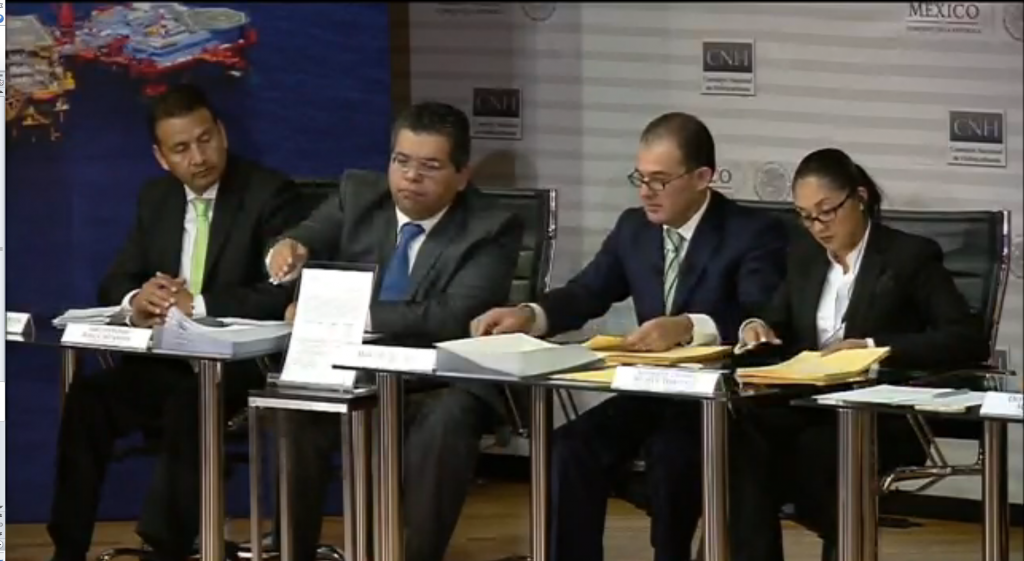
Mexico’s first auction of offshore oil leases fell short of the country’s expectations as several majors decided not to participate.
Only two of the 14 shallow-water blocks released on Wednesday received qualifying bids. Exxon Mobil Corp., Chevron Corp. and Total SA passed on the country’s sale of territory in the Gulf of Mexico, 77 years after the country nationalized crude. The 14 percent success rate was less than half the 30 percent to 50 percent goal that the government said would be its minimum for judging the event a success.
The auction was the first in a series that will help determine whether Mexico can reverse a decade-long decline in crude output and fulfill President Enrique Pena Nieto’s pledge to double the speed of economic growth. The output drop and an almost 50 percent plunge in oil prices during the past year had already forced Mexico to trim government spending and sweeten the contract terms for prospective bidders.
“This has to be crushingly disappointing for the government,” Duncan Wood, director of the Mexico Institute at the Woodrow Wilson International Center for Scholars in Washington, said Wednesday. “It has to be seen as a very clear message that they need to do a lot more to make the oil and gas opening a success.”
Oil Prices
The auction’s results can’t be entirely blamed on the fall in oil prices, National Hydrocarbons Commissioner Juan Carlos Zepeda said in a press conference following the event Wednesday. Even though the auction didn’t have the expected results, it’s important to highlight the “impeccable, unprecedented transparency” throughout the entire process, he said.
The government lowered its investment estimate to $2.6 billion from an initial $17 billion, Zepeda said. The larger figure was based on selling all 14 blocks and an average investment of about $1.3 billion each.
Sierra Oil & Gas, the first private oil company formed after the country’s energy overhaul, won the only two blocks of the day. Sierra bid alongside Premier Oil Plc and Talos Energy LLC to beat out companies such as Statoil ASA and a consortium led by Eni SpA to win rights to develop blocks 2 and 7, located in the shallow waters off the coasts of Mexico’s Veracruz and Tabasco states, respectively.
Sierra, led by Chief Executive Officer Ivan Sandrea, announced its intention to participate in Mexico’s oil industry after private equity firms Riverstone Holdings LLC, EnCap Investments and Infraestructura Institucional pledged to commit a total of $525 million to start the company. The consortium offered to provide the government profit margins of as high as 86 and 88 percent on the two blocks, according to Deputy Finance Minister Miguel Messmacher.
Offshore Blocks
Block 2 has as much as 341 million barrels of oil equivalent in 194 square kilometers (75 square miles) off the coast of Veracruz, while Block 7 has a maximum of 263 million barrels in 465 square kilometers off the coast of Tabasco, according to the National Hydrocarbons Commission.
Statoil and Eni were among 14 of 38 qualified companies that participated in the auctions.
“The shallow-water blocks were always going to draw less interest” than fields in deeper seas that have yet to be auctioned, said Bloomberg Intelligence analysts Vincent Piazza and Gurpal Dosanjh. For Mexico, “this is a long-term process to reinvigorate the industry. There’s likely going to be some fits and starts.”
Spokesmen for Exxon and Chevron said that while they weren’t interested in the shallow-water round of bidding, they haven’t given up on being part of Mexico’s energy reform.
Chevron “continues evaluating opportunities in Mexico and remains optimistic about the steps taken by the Mexican government to open the energy sector,” Isabel Ordonez, a Chevron spokeswoman, said in an e-mail on Wednesday.